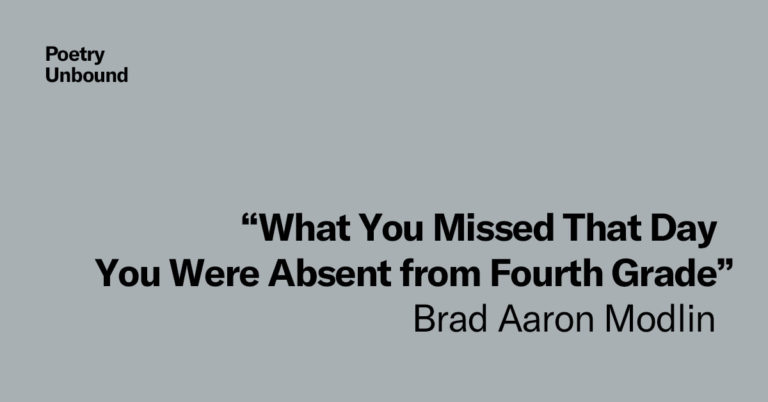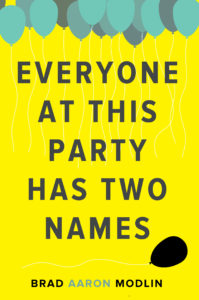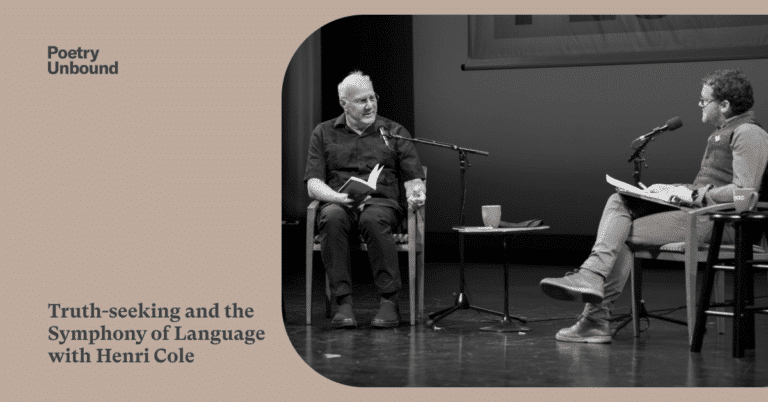Brad Aaron Modlin
What You Missed That Day You Were Absent from Fourth Grade
Brad Aaron Modlin’s poem “What You Missed That Day You Were Absent from Fourth Grade” speaks of learning to grow up by yourself. The poet wonders what life lessons would look like if they could be taught by a teacher; a good teacher, a teacher like Mrs. Nelson.
A question to reflect on after you listen: What life lessons did you have to learn by yourself?

© All Rights Reserved.
Guest

Brad Aaron Modlin is the Reynolds Endowed Chair of Creative Writing at the University of Nebraska at Kearney. He holds a PhD from Ohio University and an MFA from Bowling Green State. His poetry collection is Everyone at This Party Has Two Names.
Transcript
Pádraig Ó Tuama, host: My name is Pádraig Ó Tuama. I’m a poet from Ireland. And I turn to poetry because I don’t always sleep well. And in the middle of the night, I like to get up and to do something kind and calm and calming to help me get through a night when I know I’m not going to sleep. And I find that accompaniment to be a great friend in the middle of the night.
[music: “Ashed to Air” by Gautam Srikishan]
“What You Missed That Day You Were Absent from Fourth Grade” by Brad Aaron Modlin:
“Mrs. Nelson explained how to stand still and listen
to the wind, how to find meaning in pumping gas,
how peeling potatoes can be a form of prayer. She took
questions on how not to feel lost in the dark.
After lunch she distributed worksheets
that covered ways to remember your grandfather’s
voice. Then the class discussed falling asleep
without feeling you had forgotten to do something else—
something important—and how to believe
the house you wake in is your home. This prompted
Mrs. Nelson to draw a chalkboard diagram detailing
how to chant the Psalms during cigarette breaks,
and how not to squirm for sound when your own thoughts
are all you hear; also, that you have enough.
The English lesson was that I am
is a complete sentence.
And just before the afternoon bell, she made the math equation
look easy. The one that proves that hundreds of questions,
and feeling cold, and all those nights spent looking
for whatever it was you lost, and one person
add up to something.”
The title of the poem, “What You Missed That Day You Were Absent from Fourth Grade,” has a great sense of humor in it — the idea that any teacher would teach 9 or 10-year-olds how to chant the Psalms while taking cigarette breaks is fantastic and ridiculous. But it speaks to the strong sense of a person feeling that they missed out. And I found myself, when I read this poem, thinking, what was the day we were taught that gay boys are boys too? What was the day that you were taught that loving poetry was enough? What was the day we taught that feeling desperately lonely, even when you’re 10, was OK? How could we be brought into the consolation that as you looked at your own family and felt like everybody else’s family is more together than mine — that that’s OK? How could any of these things be wrapped into the story of a life? This poem invites, I think, the reader to look back to the story of their own life and to think, where are the times when I felt out of my depth, when I felt, nobody told me that this would be happening, and not only did nobody tell me, but nobody prepared me to know how to survive the not-knowing? And this poem imagines this kind, gentle character of Mrs. Nelson, who taught a class how to do these things.
But even in that imagination, the poet was absent from that day. And so the poet has probably taught himself all of these things. And that’s the way with everybody.
When I was 11, there was a man who was involved as a youth worker. He was from Belfast; I’m from Cork, on the very south of the island. And Aldo Maliacho was this man’s name. And Aldo became a real mentor to me, a real friend. He would phone up my parents and say, “Oh, I’m driving around different youth camps around the country for the next two weeks; will I take Pádraig?” And so I loved it. I got to drive around the country in his amazing Saab car, and he would let me roll the windows up and roll the windows down, and we’d talk about books. And he’d ask me, “What do you think about religion?” And I was very anxious, because he was a church youth worker. I was very anxious to bring holy books to read with me. I remember one time he said to me, “I think you’d enjoy reading other kinds of books, too.” [laughs] And it was lovely that — he was a genuine mentor to me.
A few years ago, I was in New York City, and I got a text from an old friend to say, “Aldo’s just died.” And I was staying, for that trip, up near Central Park. And I walked — I don’t know how long it took me; it was a freezing night, lots of rain. And that was good, because it washed all my tears away, because I looked back at my own self through the lens of this man who had just died and found myself filled with the gratitude that Aldo Maliacho was a person who brought me into my own life. I kept on repeating his name, over and over, like it was a blessing.
I think the beautiful gift that Brad’s poem brings to people who listen to it for the first time, or for the 50th time, is that you can look at the things that you’ve had to teach yourself in your own life and recognize that while you might feel like “I learned that late,” that, nonetheless, you did learn it. You learned it at a time when you needed to learn it. And you found the wisdom from wherever you found it. And I think this poem is filled with a sense of respect for the reader — for the reader in who they were as a child, a sense of respect for the reader in who they were as the person who felt inadequate, and also, a sense of respect for the reader in terms of who they are now.
“What You Missed That Day You Were Absent from Fourth Grade” by Brad Aaron Modlin:
“Mrs. Nelson explained how to stand still and listen
to the wind, how to find meaning in pumping gas,
how peeling potatoes can be a form of prayer. She took
questions on how not to feel lost in the dark.
After lunch she distributed worksheets
that covered ways to remember your grandfather’s
voice. Then the class discussed falling asleep
without feeling you had forgotten to do something else—
something important—and how to believe
the house you wake in is your home. This prompted
Mrs. Nelson to draw a chalkboard diagram detailing
how to chant the Psalms during cigarette breaks,
and how not to squirm for sound when your own thoughts
are all you hear; also, that you have enough.
The English lesson was that I am
is a complete sentence.
And just before the afternoon bell, she made the math equation
look easy. The one that proves that hundreds of questions,
and feeling cold, and all those nights spent looking
for whatever it was you lost, and one person
add up to something.”
Lily Percy: “What You Missed That Day You Were Absent from Fourth Grade” comes from Brad Aaron Modlin’s book Everyone at This Party Has Two Names. Thank you to Southeast Missouri State University Press, who published the book and gave us permission to use Brad’s poem. Read it on our website at onbeing.org.
Poetry Unbound is Tony Liu, Chris Heagle, Kristin Lin, Erin Colasacco, Serri Graslie, Eddie Gonzalez, and me, Lily Percy. Our music is composed and provided by Gautam Srikishan. And this podcast is produced by On Being Studios, which is located on Dakota land. We also produce other podcasts you might enjoy, like On Being with Krista Tippett, Becoming Wise, and This Movie Changed Me. Find those wherever you like to listen, or visit us at onbeing.org to find out more.
Books & Music
Recommended Reading
The On Being Project is an affiliate partner of Bookshop.org and Amazon.com. Any earnings we receive through these affiliate partnerships go into directly supporting The On Being Project.







